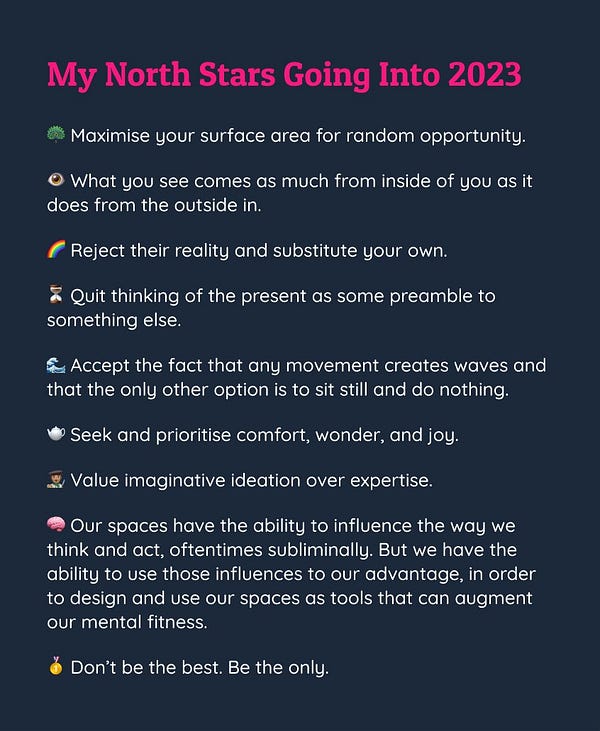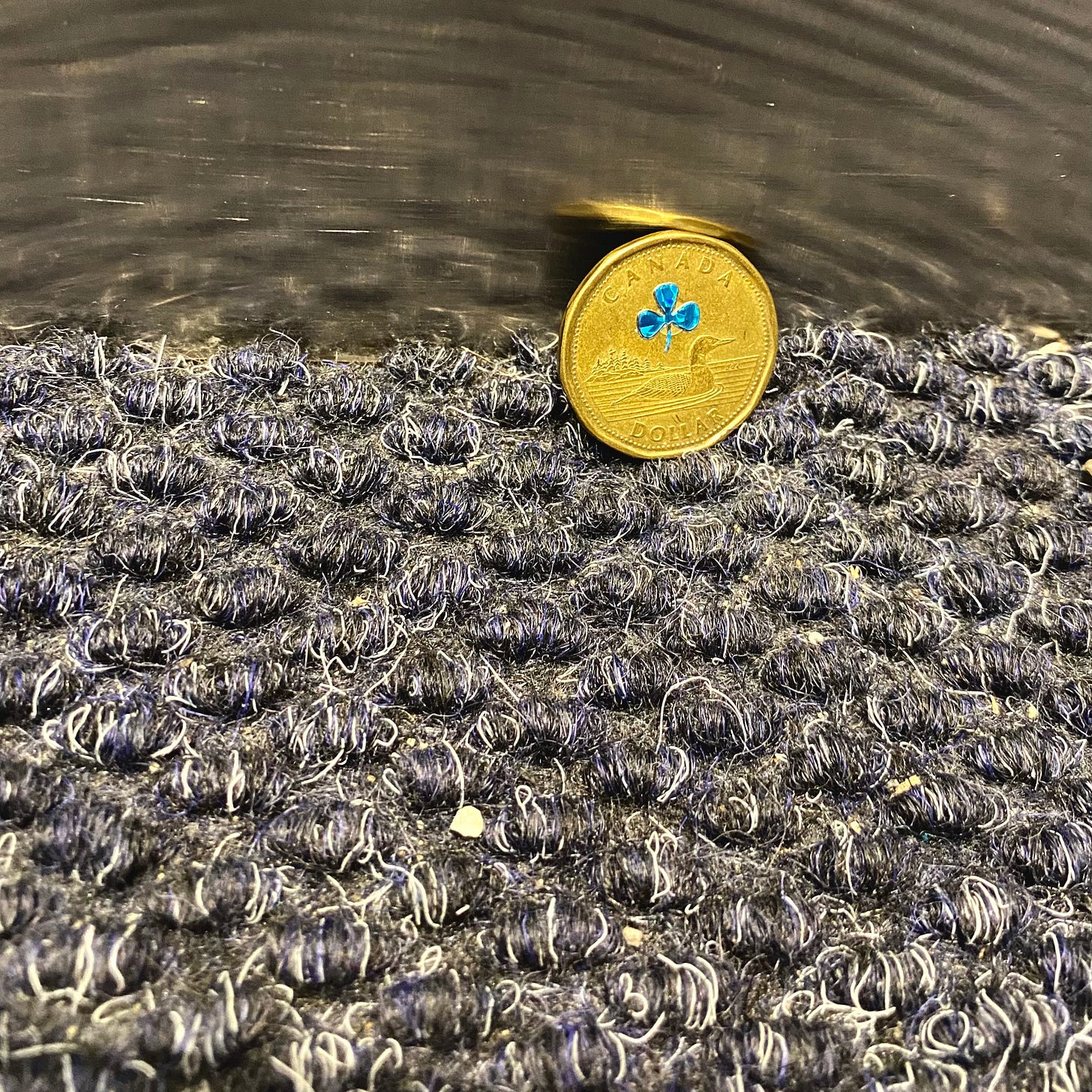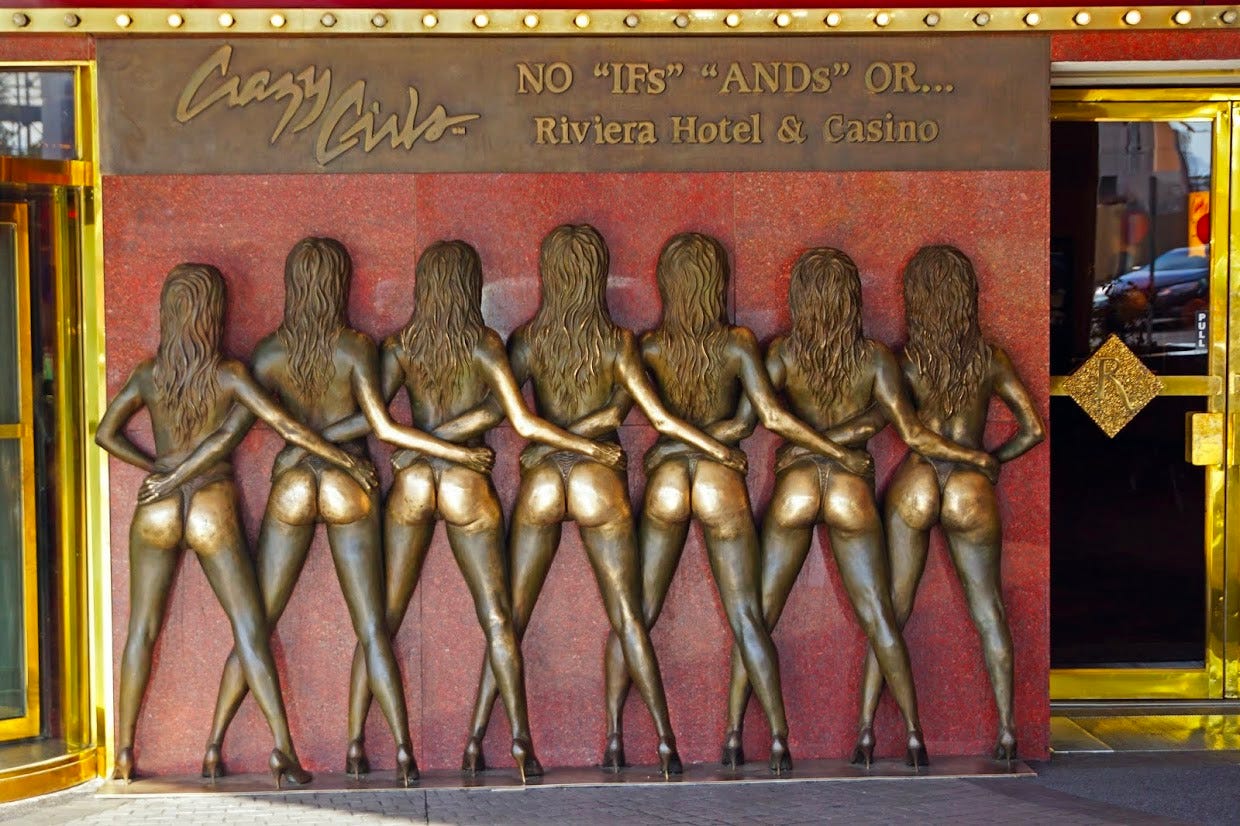A Guide To Finding Lucky Locations
The world around us is full of fortune waiting to be found. So, where can we go to increase our surface area for serendipity?
Introduction
I left a loonie in an elevator the other day. (That’s $1 for you non-Canadians out there.)
I wanted to be the catalyst for someone else’s serendipity. I wanted to push the first domino that commenced an elaborate fortune-filled Rube Goldberg Machine. One where someone walks into an elevator naked and walks back out witnessing the world through a fresh pair of lucky lenses.
A dollar isn’t much, but who knows what that little bit of luck snowballed into.
Maybe that dollar was used to buy a winning lottery ticket. Maybe it led to a more lively “how was your day” conversation. Maybe it was a good omen for someone going on a date. And maybe because they were feeling lucky, they got lucky that night.
Believing that we are lucky is a proven life hack for successfully finding luck. Those times when we feel lucky are the ones when we are more likely to see luck when it’s near.
British psychology professor Richard Wiseman conducted a fascinating experiment about self-perception: He found people who identify as either "extremely lucky" or "extremely unlucky," and he tested how they perceive the world.
In one experiment, he selected two participants: Martin, who considers himself lucky, and Brenda, who considers herself unlucky. The research team asked both participants to walk down a street toward a coffee shop (separately from each other), go into the coffee shop, buy a cup of coffee, and sit down. Hidden cameras in the street leading up to the coffee shop as well as in the coffee shop itself filmed them. The researchers placed a five-pound note on the pavement directly outside the entrance to the coffee shop, so that the participants would need to step over it. They also rearranged the coffee shop to only have four large tables, placing one person at each of these four tables: Three of them were actors, and one of them a successful businessman. The successful businessman was sitting close to the coffee counter. The four individuals were briefed to interact the same way with both participants. Can you guess the outcome?
Martin, the lucky person, walked up the street, recognized the five-pound note, picked it up, and went inside. He ordered a coffee and sat down next to the businessman. He started a conversation and made friends with him. Unlucky Brenda, on the other hand, failed to spot the five-pound note. She, too, sat down next to the successful businessman, but remained silent until the end of the experiment.
When Wiseman's team asked the two later how their day had been, they received two very different responses: Martin described how it had been a great day, that he found a five-pound note and got into a great conversation with a successful businessman. Brenda, unsurprisingly, said it had been a completely uneventful morning.
Both participants were presented with exactly the same potential opportunities, but only one of them "saw" them.
🔗 / The Serendipity Mindset — Christian Busch
Aside from occasional lift loonies and cafe cash, the world around us is full of fortune waiting to be found. So, where else can we go to increase our surface area for serendipity?
Scope of This Post
Question: Where can we find spaces that supply luck?
Defining “supply”: Likely to give us more than we had before.
Defining “luck”: Good fortune; advantage or success, considered as the result of chance.
Step 1: Calibrate Our Compass
What makes you feel lucky?
The kind of luck that you and I seek is built into our individual values and goals. We feel fortunate if we attain something we value.
People who value money would feel lucky finding that loonie. Those of us who value novel mindsets would feel lucky discovering an interesting perspective.
The luck we appreciate the most are the ones that somehow benefit our current goals and values. So, defining those is our best first step in finding lucky spaces.
North Star Strategies
Not sure what your values or north stars are? Here are a few strategies I’ve used to uncover my own:
Reflect on why you enjoy your favourite content (blog posts, newsletters, YouTube videos, Instagram and Twitter feeds). What do they do for you? Can it reveal something deeper about what you currently value?
What do you currently regret? What will you regret in the future? These can often inform the core basis for our decisions and behaviours.
Who are your most and least favourite characters from movies, shows, games, stories, books, and real life? What are the specific qualities of their personality or life that you love and hate? Those characteristics tend to be particularly meaningful values and anti-values for us.
What are your favourite action-oriented quotes? Unlike the prototypical values (integrity, kindness, autonomy…), North stars don’t have to be confined to a single word. Mine are a short list of phrases which I consult regularly.


Each of those can then be summarized into single words, if I wanted to convert them into a list of my core values.
In addition to defining our north stars, another strategy we can use to figure out what luck we’re looking for is to consider the times we’ve felt lucky in the past.
Remembering Luck
When and where was the last time you got/felt lucky?
What were the last best things that happened to you and where did they spur from?
Going back through your north stars and values, when and where did you last feel lucky in relation to those?
What are your main life blocks (the categories you can divide your current life into)? Mine are my body, environment, finance, mind, recreation, and social blocks. When and where did you last feel luck in relation to those? Considering your social block, for example: where’d you meet your last date? And where’d you last make a new friend?
Once we have an idea of what’s important to us right now, we can start to envision what kind of luck we want to find. We can use our north stars to think deeper than “winning the lottery” as our answer to what a lucky day in our life would look like.
Anticipating Luck
What would luck look like for each of our values right now?
Compass calibration caveat: the goal we’re hoping for isn’t always the goal we need.
One helpful way of conceptualizing serendipity is by thinking about it in 3 types:
Serendipitous Events: The fortune we find when we aren’t actively looking for luck.
Serendipitous Paths: The fortune we find when we have a goal in mind and we have a plan on how to get there, but luck guides us to a better path to get there that we hadn’t even considered.
Serendipitous Destinations: The fortune we find when we have a goal in mind, but luck leads us to an even better goal than we had before.
Seneca argued that luck is a matter of preparation meeting opportunity. But, sometimes anticipation and clear goals can blind us to the luck we can’t anticipate.
In one experiment participants interacted with a reading device. Some were given a specific task to find out some particular information. Others were given no task at all. The results were clear: While the first group often did find out the specific information they were seeking, the second group were much more exploratory in their interaction and tended to come away with all kinds of interesting information that was not previously sought.
🔗 / The Serendipity Mindset — Christian Busch
Finding a balance between knowing what we want and being open to what comes our way is the key to calibrating our compass.
Step 2: Don Our Luck Lenses
Luck is a mindset as much as it is a phenomenon. And looking at the world through a pair of luck lenses allows us to notice the fortune around us.
The Serendipity Mindset
The Serendipity Mindset is about recognizing that we can open ourselves to the unexpected. And it is about being prepared and free from the preconceptions that can stop us being the victims or beneficiaries of luck (bad or good). We can nurture it, shape it, and make it a tool for life. In the science of serendipity, luck can be taught, coached, and created.
🔗 / The Serendipity Mindset — Christian Busch
“Chance favours only the prepared mind.” — Louis Pasteur. So how can we prime ourselves to become more aware of potential prosperity.
If you think about it, you will realize that we all actually do look out for the unexpected every day, but generally only as a defence mechanism. When we use a pedestrian crossing on a busy road, we expect the cars to stop at a red light. But most of us do not take that entirely for granted. Even when the light turns red and we step out into the road, we turn half an eye to the traffic, because we also know that occasionally a driver will not stop at a red light. In a situation like this, our field of vision is broader than usual and we are looking out for the unexpected, because we know that missing it could be fatal. Imagine if we applied the same approach to the positive — keeping a broader field of vision and being alert to the unexpectedly good or useful things that might happen.
🔗 / The Serendipity Mindset — Christian Busch
Spaces of Gratitude
Some spaces provide luck, like my loonie elevator. And some spaces give us the space to reflect on how lucky we are — our gratitude journals, the comforting home of a loved one, spaces with an abundance of something we love, etc. Gratitude is essentially a reflection of how lucky we believe we are. And the more we reinforce being lucky as part of our identity, the more luck we’ll encounter.
We can approach having the right mindset from two sides: reinforcing luck into our identity and ousting the biases and preconceptions that can blind us to serendipity.
Egocentric bias
A lot of us have a tendency to take more credit than we might deserve. One study, for example, asked authors of multi-authored papers what percentage of the work they personally did. When they added up those percentages, the sum was on average 140%.
A similar study on the topic asked couples what percentage of the housework they do. The combined percentage almost always surpassed 100%.
Potential conclusion to takeaway: we experience and vividly remember all of what we do, but not all of what everyone else does. So naturally, we over estimate our own contributions and underestimate the contribution of others.
This egocentric bias not only makes us underestimate the contribution of others, but it influences to us underestimate the impact that luck has played in our success. If we ignore the role of serendipity in our past, then we could be blinding ourselves to it in the present.
Spaces We Know
We get so used to walking in the same paths everyday that we become habituated to our surroundings. We’ve got our muscle memory working for us, so we put our legs on auto pilot and divert our eyes from our environment and to our phones. Switching things up from the spaces we’ve become most familiar with could force us to reawaken our vigilance for luck.
Spaces that Deviate
Functional fixedness is a cognitive bias that refers to the way we get so use to using a tool in a familiar way that we end up lacking the creativity to consider using that same tool in novel ways.
Sometimes serendipity comes down to creative problem solving and seeing the world through an unexpected perspective. On a walk the other day, I passed by Poop Cafe, Toronto's Toilet Themed Dessert Bar. To be honest, I was grossed out by the concept, but on second thought, this might be the deviation that we all need in our lives 😬
Luck is sensitive to the self-fulfilling prophecy. If we truly internalize that we are lucky, we will be a lot more likely to proactively engage with the world in such a way that luck will be manifested. Once we’ve internalized that we’re lucky our lenses should be in a good position to actually serve as a luck radar. Of course things can still be outside of our radar’s field of vision, so we still have to find lucky landmarks and increase our surface area for random opportunity.
Step 3: Locate Our Lucky Landmarks
When I think of where luck might live I think about chasing rainbows — if we make it to the end of a rainbow, we’ll find a lucky Leprechaun, and if we catch them, they’ll give us their pot of gold.
I’m not much of a runner. Alas, that all seems much too impractical to me. So, where else can we go to locate luck?
Research “luckiest places in the world” on your favourite search engine and you’ll find all the lore.
Spaces Deemed Lucky
You’ll likely come across the stories of Point Zero — the centre of Paris where a myriad of good luck rituals are performed.
Or the lore of how good luck comes to those who rub the bronze booties of the Crazy Girls statue in Las Vegas.
Or how rubbing The Guardhouse Monkey’s head in Belgium with your left hand will gift you good luck for a year.
Spiritual serendipity hotspots are scattered from sea to sea, but luckily we’re not bound to supernatural intervention. We can take control of our own luck by taking advantage of the serendipitous settings close to home.
Spaces with Agents of Luck
When I left that dollar in the elevator, I was acting as an agent of luck. I created an environment where the next person to use that elevator was in the right place at the right time.
Think about how many other agents of luck are out there. The mutual friend who introduces future newlyweds to each other. The family member who knows a gal who knows a guy who can get you a job interview at your dream company. The meetup which hosts an event that will bond a group of strangers into a meaningful friendship.
What would be great to find are the places where agents of serendipity like to hangout.
Spaces with Interesting People
Our likelihood for serendipity increases in places where there is a higher concentration of people we’d find interesting. So using our north stars from step 1, we can try figuring out where others with similar ambitions and values might congregate.
Spaces Inside Our Head
Chance encounters don’t just happen in the external world. They happen in our minds as well.
These are the sparks of inspiration that we tend to only get when we’re in the shower.
Or the solutions to the problems that only come to us after a good night’s sleep in a cozy bed.
Figuring out where you are when you get your best ideas could be a lucky landmark quest worth tracking.
Spaces Online
Online spaces can be a powerful tool for serendipity.
Share what you love, and the people who love the same things will find you.
🔗 / Show Your Work — Austin Kleon
Spaces with Bad Luck
Chance is not always a welcome guest. The snags and backlashes of bad luck are everywhere.
🔗 / Chase, chance, and creativity : the lucky art of novelty — James Austin
If we go into a space expecting bad luck, but nothing bad happens, then we might be more likely to believe that we are lucky.
A research team presented people who consider themselves "lucky" and "unlucky" with the following scenario: Imagine you are in a bank when an armed robber enters and shoots you in the shoulder. You escape with a flesh wound.
People who self-identify as "unlucky" will frame this situation as something that tends to happen in their life. This would be one more bad experience in a line of them. "Lucky" people will frame it as a situation that could have been worse, such as "the bullet could have killed me," or "I could have been shot in the head."
What is happening here? Lucky people tend to frame counterfactuals along the lines of what could have been worse, while unlucky people frame them as what could have been better, or even more pronouncedly, as "the story of my life."
Lucky people also tend to compare themselves with others who have had less luck (that is, with the person who was killed during the robbery), while unlucky people tend to compare themselves with those who had more luck (the person who didn't get hurt at all).
🔗 / The Serendipity Mindset — Christian Busch
Going into places where we feel outside of our comfort zone and coming back out unscathed might give us the impression that we are lucky. It could also give us the confidence to continue venturing outside of our normal routines and patterns, thereby expanding our surface area for random opportunity.
Conclusion
I wonder how often we miss the presence of luck. How many opportunities, or soulmates, or loonies we’ve missed because we weren’t paying attention — or perhaps even worse, because we didn’t think that luck would be on our side.
What would you feel more comfortable doing if you knew that you had a 95%+ chance of success?
Thanks for reading! Sending lucky vibes your way,
Lamar ✌️😁






Wow! What an insightful and uplifting point of view you offer in this article! Certainly something powerful to think about and I completely agree that our mindset can highlight opportunities or it can limit us. Thank you!!